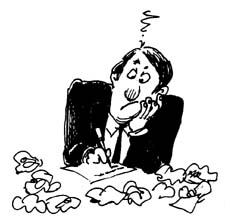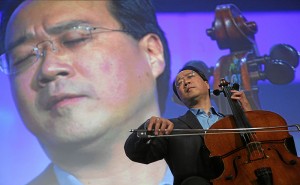 Have you experienced writer’s block? That condition where you feel the desire or pressure to write but you can’t actually come up with any words? It’s a real thing, an occupational “hazard” first diagnosed in 1947.
Have you experienced writer’s block? That condition where you feel the desire or pressure to write but you can’t actually come up with any words? It’s a real thing, an occupational “hazard” first diagnosed in 1947.
I think there are two forms of it–Major Writer’s Block and minor writer’s block. I define MajWB as the state of being unable to start writing a new work, and of long duration. On the other hand, minWB is a short-term state of being stuck while in the midst of a work. MajWB can last for years or even be a career-ender. But minWB is almost always temporary, lasting a few hours or days. I have yet to experience MajWB, but get the minor version often.
In either case, the symptoms are pretty much the same. Words won’t come out, try as you might, and after a while you don’t feel much like trying. I pay attention to the blogs of writer Andrew Gudgel (full disclosure: Andy and I are friends), and he wrote a great blog entry on writer’s block on May 3, 2011. In it, he states that the condition of not writing is only a symptom, not the problem itself. He makes the case that only when you know the problem can you begin to solve it, and that the problem itself points to the solution.
He divides the spectrum of possible problems into craft-related problems, and problems with other aspects of the writer’s life. I’ll divide writing block problems a different way, as follows:
- Story-related problems:
- plotting problems–the story isn’t going in the right direction
- character problems–a character isn’t fully fleshed out, or is taking over the story, or is otherwise not proving suitable
- setting problems
- other problems with the story itself
- Craft-related problems that are writing-related, but not about the story:
- overwhelmed by task
- inferiority complex, thoughts that your writing won’t measure up
- lost interest
- pressured by deadline
- paralyzed by own success
- pressure of audience too close (more below)
- Personal, but non-writing, problems:
- illness
- depression
- relationship problems
- financial difficulties
Again, identifying which real problem is present can point toward the solution. The stress caused by any of the problems above can really inhibit the normal creative process. What’s thought to happen in the short term to the human brain under stress is a shift of activity from the cerebral cortex to the limbic areas. In other words, the focus shifts from the areas devoted to attention, consciousness, language, memory, and thought to the basic, instinctual fight-or-flight area we inherited from the dinosaurs. Extended periods of stress damages brain cells, weakens memory, and causes depression. All of that is bad news for writers.
Most of the items on the list of problems above are self-explanatory, but I thought I’d discuss the pressure of the audience in more detail. Writing expert Dr. Peter Elbow wrote a much-discussed essay called “Closing My Eyes As I Speak.” He claims writers feel the presence of an audience as they write. Unlike performance artists such as singers or stand-up comedians, writers do not have their audience physically present, but they often imagine how readers will react to their work. Dr. Elbow considers the pressure of this unseen audience can disrupt the flow of words, and suggests writers disregard the audience as they write their first drafts. The writing will be more natural and genuine.
 As a non-writing example, look at this picture of world-famous cellist Yo-Yo Ma in performance. He often plays with eyes closed, as if he’s deliberately distancing himself from his audience and playing only for himself in his own private world. Metaphorically, we should all write that way, too, at least in our first drafts.
As a non-writing example, look at this picture of world-famous cellist Yo-Yo Ma in performance. He often plays with eyes closed, as if he’s deliberately distancing himself from his audience and playing only for himself in his own private world. Metaphorically, we should all write that way, too, at least in our first drafts.
I’ve discussed the condition of writer’s block and potential causes, but never got around yet to how to overcome it. Getting unblocked will have to be the subject of a future blog post by–
Poseidon’s Scribe
